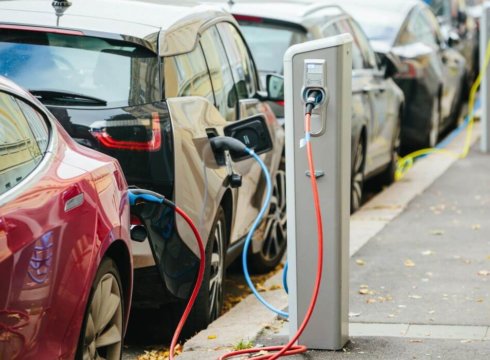Several Domestic & Global Firms Expressed Interest In Partnering With The Govt. To Turn India Into A 100% EV Nation
Inc42 Daily Brief
Stay Ahead With Daily News & Analysis on India’s Tech & Startup Economy
To expedite its electric mobility mission, the Indian government is reportedly seeking investment from a number of companies, both domestic and foreign. According to sources, the raised capital will be spent on purchasing electric vehicles, three wheelers, batteries and charging stations for deployment across the country.
A portion of the multimillion-dollar investment will go into building a robust charging infrastructure in cities all over India.
To that end, the Government of India has already held talks with over 50 Indian and global companies. As per reports, cab aggregators like Ola are also preparing for bulk purchases of electrically-powered three wheelers and rickshaws, which they would then lease depending on demand.
As revealed by a government official close to the development, several companies, including Tata Power, ABB, Acme Industries and a couple of Dutch firms have expressed interest in setting up electric charging stations in the country.
Other companies such as Exide Industries, Amron Batteries and Microtek are looking to supply batteries and set up repair shops for motorists as part of the government’s electric vehicles project.
In a recent interaction with ET, Praveer Sinha, Chairman and Managing Director of Tata Power Delhi Distribution revealed plans to team up with Delhi Metro Rail Corp (DMRC) and the Municipal Corporation of Delhi to erect charging stations at metro stations and other locations across the country.
According to Sinha, once electric vehicles become more mainstream, an area of 3 km will need nearly 300 charging stations with four to five charging slots each. The cost of setting up a rapid-charging outlet, he added, is around $38,245 (INR 25 Lakh), while that of a slow charging station will be around $1,529 (INR 1 Lakh).
At this price, building an extensive network of charging stations across Delhi would require an investment of more than $504.7 Mn (INR 3,300 Cr) over the course of five years.
The government-run NTPC and Power Grid Corporation of India are also reportedly engaged in talks with DMRC and other entities for setting up charging infrastructure in up to six cities. In a bid to cut costs, the government is considering selling electric vehicles, including three wheelers, city buses and cars, without batteries. To that end, both NTPC and Power Grid Corp are planning to purchase batteries in bulk, which would later be leased out to the government.
The development comes less than two weeks after the government awarded Tata Motors a tender for 10,000 electric vehicles in NCR. Mahindra, one of the six companies bidding for the tender, later said that it would match Tata Motors’ lowest bid of $15,534 (INR 10.16 Lakh) per vehicle, so as to be able to work with the government in its mission to switch to 100% electric vehicles by 2030.
100% Electric Vehicles By 2030: Realistic Or Just A Dream?
As per a report by the Society of Manufacturers of Electric Vehicles, there has been a 37.5% rise in the sale of EVs in India in recent years. In the last couple of years, the government has doubled down in its efforts to make India a 100% electric vehicles nation.
Following are some of the initiatives the government and Indian companies have taken to further the electric mobility mission in recent months:
The segment has also been garnering traction from investors in recent years. In October 2016, Bengaluru-based startup Ather Energy raised about $27 Mn (INR 180 Cr) investment from Hero MotoCorp against 26%-30% stake. In May 2017, ION Energy secured funding from the founders of OMC power, Nippo Batteries and others.
Later in August, Mumbai-headquartered JSW Energy promised $545.72-$623.68 Mn (INR 3,500-INR 4,000 Cr) for the next three years, as part of its plans to launch electric vehicles by 2020.
To be able to achieve the ambitious goal of 100% electric vehicles by 2030, the government will have to earmark a sizeable investment not only to purchase electric cars, three wheelers and buses, but also to build a robust infrastructure of charging stations. Keeping that in mind, the Indian government is looking to raise investments from domestic as well as international companies to expedite the mission.
Note: We at Inc42 take our ethics very seriously. More information about it can be found here.


